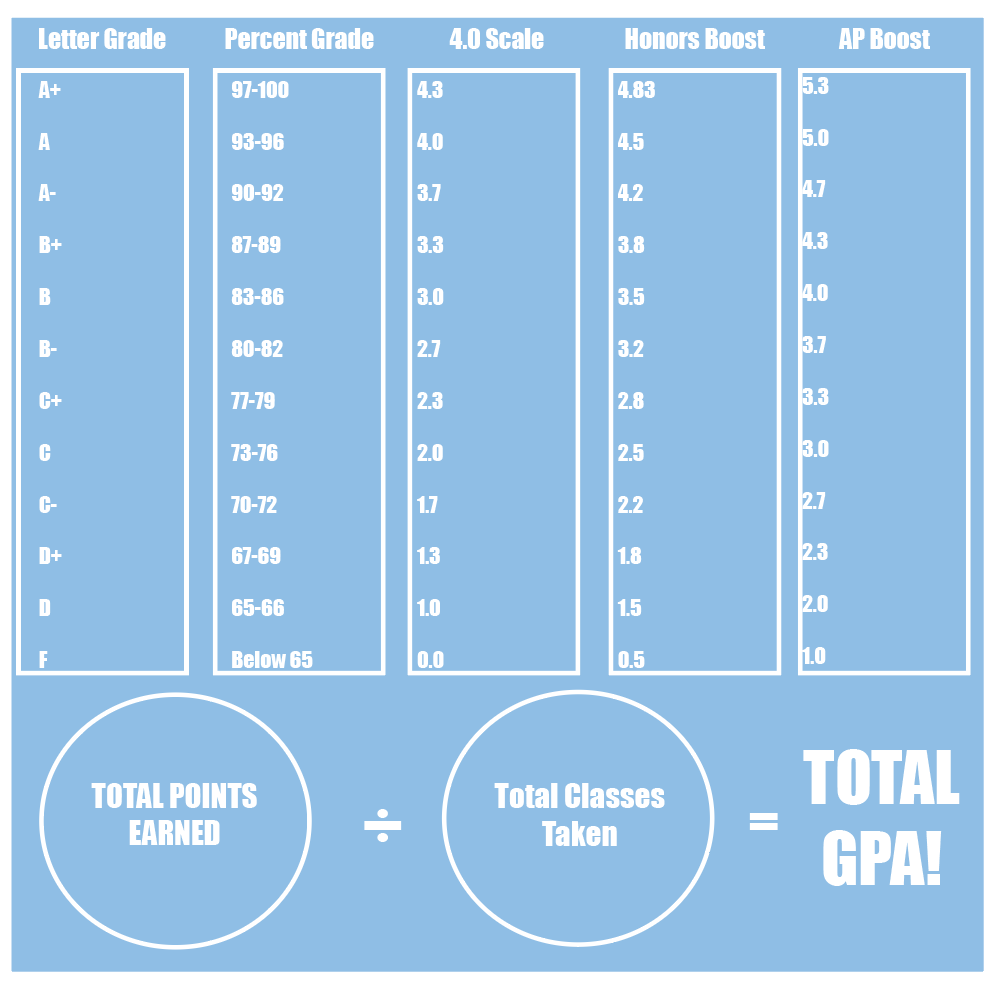In the world of academic records, report cards, and college applications, a Grade Point Average (GPA) plays a vital role.
The GPA is a numerical representation of a student’s academic performance. It reflects one’s overall understanding of the material they learned and the quality of their work and is extremely important when applying to college or a potential job.
Benjamin uses a weighted 4.0 GPA scale, with letter grades corre- sponding to a specific number value. In a weighted GPA, a certain class carries more “weight” than others due to their proven difficulty. This means that a student could potentially earn more than a 4.0 for an A grade in an honors or Advanced Placement (AP) course, both of which Benjamin offers. The system is designed to rec- ognize and reward students for taking more challenging courses.
However, not all schools use a weighted GPA, in fact, colleges often recalibrate the GPA’s students submit because they recognize that all schools follow a different system. Director of College Counseling, Mrs. Anna Wright, feels that although colleges may recalculate a student’s GPA, the grades that they get during high school are crucial to their success.
“Colleges understand that some schools offer AP and Honors classes while others may not and so they recalculate the GPA to make it comparable against other schools. So the number of your Benjamin GPA in itself isn’t necessarily important because the school that you are hoping to attend will most likely recalculate it. However, what is important is your grades, and the rigor of your course load. This is of course reflected in your GPA, but the actual GPA number and how the Benjamin school calculates it may or may not be important depending on what university you apply to,” Wright explained.
Wright’s assessment brings up an issue at the heart of the admissions process: are we accurately communicating the rigor students are reporting they feel in class? How are we showing that our class is tougher even though it has the same name as a course offered across the street?
When a student applies to a university, the college receives up to a four-page Academic Profile of the high school they currently attend. Some high schools share class rankings, others show grade distributions, but Benjamin does not.
“We try to point out the areas where students best succeed; that is where we have overperformed in the AP courses, where we have beaten the Florida National Average for those courses, and highlight programs and distinctions of some of the publications at our school. The one thing we do not have is the grade distributions of students. We originally had it on the Profile but after talking to some of the admissions officers of several universities we found that providing that information was only helping the few top students and hurting the rest of the class. We realized that when colleges knew what the highest GPA was, someone who had a GPA lower than that number was thought of as much less than, so we decided to take it off of our Profile,” Wright said.
However, one thing that seems to set students at Benjamin apart is the quality of the teacher recommenda- tions.
“The teacher recommendations that the faculty writes for our students are like night and day with other schools. The recommendations that the teacher’s are writing not only share how hardworking the students are here at Benjamin, but also help to show the rigor and quality of people. They show that the teachers care about their students here and that the students care about their grades, are good people, and have made an impact with the people around them,” Wright expressed.
When calculating a GPA, students should look at their grades in each class and assign the specific number value and “weight” that goes with it. Honors classes receive a 0.5 GPA boost, while an AP course warrants a full additional point. For instance an “A” in a regular class is equiva- lent to a 4.0 GPA, in honors it would be a 4.5, and in an AP, it would be a 5.0. After determining the numeri- cal values for each class and factor- ing in any weight adjustments, total these values and divide the sum by the number of courses you are taking. This process provides an accurate overall GPA and can help students gauge their academic performance.
Being able to calculate GPA is instrumental for educational success as students are able to gain a good understanding of how they are absorbing the material of classes. In addition to calculating GPA by hand, one can also check https://www.cialfo.co/ which automatically updates cumulative GPA after each semester.









